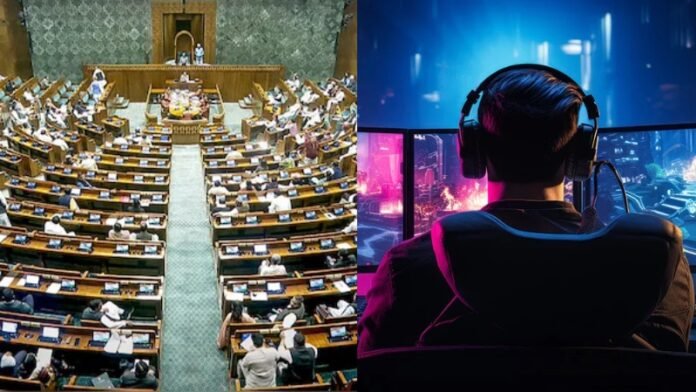The Rajya Sabha passed ‘The Promotion and Regulation of Online Gaming Bill, 2025’ on the last day of the Monsoon Session today. This comes a day after the Lok Sabha passed a legislation to ban online games. The Indian Government cited mental health concerns, suicides, and financial exploitation linked to the practice. However, will this law also impact popular fantasy sports platforms like Dream11? Let’s break this whole Bill here for you to understand it from the core.
What is the Online Gaming Bill, 2025?
After Cabinet approval, the government passed the Promotion and Regulation of Online Gaming Bill, 2025, in both houses of Parliament.
- The Bill proposes a complete ban on monetary transactions in online gaming.
- Any gaming app or platform that allows users to deposit or invest money, with the promise of winning more, will come under its ambit.
- The legislation also bans advertisements promoting such apps.
Union Minister for Electronics and IT, Ashwini Vaishnaw, highlighted the urgency of the step. He pointed out the rising cases of addiction, suicides, and exploitation linked to online money gaming platforms. “Families have been destroyed,” he noted, adding that many of these games run on opaque and unfair algorithms.
The country has seen many cases of this kind, where young people are destroying their future by making themselves addicted. It is not only causing economic problems to them and their families, but also creating mental problems in society. It is like an illness to society, which has to be cured for a better future.
What does the Bill propose?
Let’s see what exactly lies in the Bill and how it will work.
- Three years’ imprisonment or ₹1 crore fine (or both) for offering real money gaming services.
- Up to two years’ jail or ₹50 lakh fine for those who publish advertisements promoting such platforms.
- Repeat offenders could face five years’ imprisonment.
- Importantly, users of these games will not be criminally penalised. The Bill treats them as victims, not offenders.
What is exempt?
However, not all online games fall under this ban. The distinction between games should be made in order to make fun healthier. The government has made a clear distinction:
- Prohibited: All games involving monetary stakes, betting, wagering, or real-money transactions.
- Allowed & Encouraged:
- E-sports (competitive skill-based video games without money stakes).
- Casual or social gaming (such as Ludo, Candy Crush, or other mobile games).
The Bill makes clear that its intent is to curb betting-like platforms, while simultaneously boosting the Indian gaming industry in safe categories like e-sports. The Bill was more focused on stopping betting games, but not on the fun games.
Why is the government introducing this law?
The move comes amid rising social and economic pressures that demand swift intervention. Officials are deeply concerned about the sharp rise in suicides tied to severe losses on money-gaming platforms, which serves as a tragic call for better support networks. It has also increased the crimes of snatching and theft in society. Gamers who fail to bring money from home resort to these illegal crimes.
Countless players, caught in the cycle of addiction, drain life savings in pursuit of fanciful jackpots, stressing how critical it is to champion responsible gaming education. Immediate tactics could include curbs on aggressive advertising that entices with the lure of instant wealth. Thereby shielding at-risk groups. Heightened scrutiny of money-laundering and other criminal conduct linked to these apps also makes a compelling case for tougher governance. Adopting the right rules will create a gaming landscape that prioritises safety and accountability, safeguarding players and the wider community alike.
The government also sees this as an opportunity to encourage a regulated, innovation-driven gaming ecosystem focused on skill, entertainment, and e-sports, without financial risk.
Will Dream-11 and similar apps be banned?
This is the key question many are asking.
Fantasy sports platforms like Dream11, MPL, My11Circle and others allow users to create virtual teams and invest real money with the promise of winning cash prizes. Under the Bill:
- Since these involve real-money entry fees and cash rewards, they fall under the ‘transaction-based’ category of banned platforms.
- While companies may argue that such games are “skill-based,” the Bill does not distinguish between games of skill and chance once monetary transactions are involved.
This makes it highly likely that Dream11 and similar apps will face action if the Bill becomes law.
The Online Gaming Bill, 2025, marks a decisive shift in India’s regulation of digital entertainment: a ban on all real money gaming, stricter rules on advertising, and encouragement for e-sports and safe gaming start-ups.
For users, this means an end to high-stakes gaming apps that promise overnight riches. For platforms like Dream11, it could mean an existential challenge—unless they pivot to formats without cash transactions.


